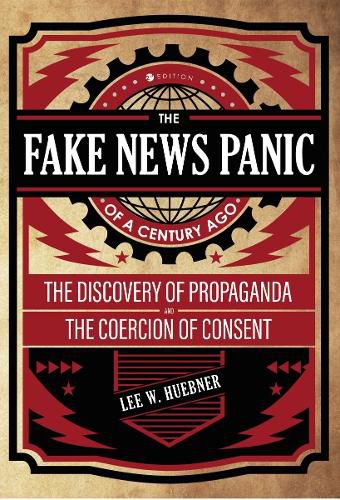Readings Newsletter
Become a Readings Member to make your shopping experience even easier.
Sign in or sign up for free!
You’re not far away from qualifying for FREE standard shipping within Australia
You’ve qualified for FREE standard shipping within Australia
The cart is loading…






This title is printed to order. This book may have been self-published. If so, we cannot guarantee the quality of the content. In the main most books will have gone through the editing process however some may not. We therefore suggest that you be aware of this before ordering this book. If in doubt check either the author or publisher’s details as we are unable to accept any returns unless they are faulty. Please contact us if you have any questions.
The Fake News Panic of a Century Ago: The Discovery of Propaganda and the Coercion of Consent looks at how the sharing of public information has changed over time-and especially at the dramatic transformation that took place in the media world in the early decades of the 20th century. Just as the term fake news has recently exploded into public consciousness, so did the concept of propaganda a century ago. The book describes two major developments that contributed to the discovery of propaganda in the decades just before and after the First World War. The first was a shift in the landscape of human psychology, emphasizing the role of the irrational impulses in human behavior and renewing age old fears of the herd mentality and the rise of the emotional mob. The second was a social upheaval, as the stability of trustworthy local communities faded and distant powers and faraway voices began to dominate public discourse. Many thoughtful observers feared that growing power of some voices meant that public consent could actually be coerced-eroding the basic concept of democratic government. Others persisted in trusting the basic rationality of public opinion. Still others struggled to find ways in which responsible leaders could guide the public without manipulating it. This book explores the writings of six well-known American leaders of the time-influential representatives of the political, business, journalistic and academic worlds-who wrestled seriously with the implications of these developments. The text underscores how their commentaries of a century ago can offer helpful insight into what has been happening in our contemporary world. The Fake News Panic of a Century Ago is an excellent supplementary resource for courses in social and intellectual history, media studies, and political theory.
$9.00 standard shipping within Australia
FREE standard shipping within Australia for orders over $100.00
Express & International shipping calculated at checkout
This title is printed to order. This book may have been self-published. If so, we cannot guarantee the quality of the content. In the main most books will have gone through the editing process however some may not. We therefore suggest that you be aware of this before ordering this book. If in doubt check either the author or publisher’s details as we are unable to accept any returns unless they are faulty. Please contact us if you have any questions.
The Fake News Panic of a Century Ago: The Discovery of Propaganda and the Coercion of Consent looks at how the sharing of public information has changed over time-and especially at the dramatic transformation that took place in the media world in the early decades of the 20th century. Just as the term fake news has recently exploded into public consciousness, so did the concept of propaganda a century ago. The book describes two major developments that contributed to the discovery of propaganda in the decades just before and after the First World War. The first was a shift in the landscape of human psychology, emphasizing the role of the irrational impulses in human behavior and renewing age old fears of the herd mentality and the rise of the emotional mob. The second was a social upheaval, as the stability of trustworthy local communities faded and distant powers and faraway voices began to dominate public discourse. Many thoughtful observers feared that growing power of some voices meant that public consent could actually be coerced-eroding the basic concept of democratic government. Others persisted in trusting the basic rationality of public opinion. Still others struggled to find ways in which responsible leaders could guide the public without manipulating it. This book explores the writings of six well-known American leaders of the time-influential representatives of the political, business, journalistic and academic worlds-who wrestled seriously with the implications of these developments. The text underscores how their commentaries of a century ago can offer helpful insight into what has been happening in our contemporary world. The Fake News Panic of a Century Ago is an excellent supplementary resource for courses in social and intellectual history, media studies, and political theory.